Bordeaux, vintage 2007. Robert Parker, the pope of all wine popes, lets it be known: "It is undoubtedly not at all necessary to buy these wines "en primeur", unless there is a drastic price reduction. But I don't expect that, to be honest." Parker is right, there is no price drop. On average, wines cost around 10% less than the year before, perhaps 15% less than the "worrying, horrendous prices of the 2005 vintage"(Parker). The Bordeaux lover is at a loss. Should he subscribe, should he not?
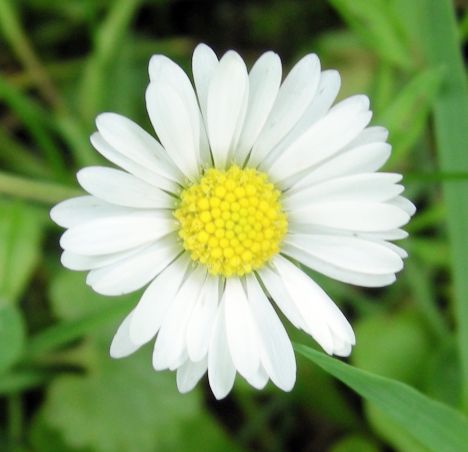 |
| The oracle: daisy or daisies |
As children, we loved to consult the oracle. We would pluck all the petals from a daisy or a daisy: "she loves me - she loves me not - she loves me " until only the yellow head remained. If the last plucked petal was accompanied by "she loves me!" we could be happy and satisfied, otherwise we repeated the game until it ended as we hoped.
Bordeaux lovers are tempted to repeat the children's game before subscribing to the rather mediocre 2007 vintage: "subscribe - don't subscribe - subscribe.". If the oracle says something different than one's wishes, it can be repeated at will.
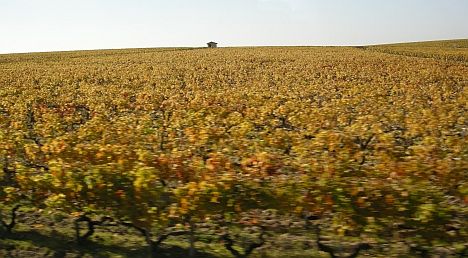 |
| Autumn 2007% shortly after the harvest in Haut-Médoc |
What is wrong with the Bordelais? Even if nobody really wants to admit it - including me! - a deep sense of insecurity has gripped the Bordeaux freaks. Nothing is the way it used to be. Not even Parker can be relied upon.
I am convinced that this general irritation was the main reason why well over 200 wine lovers recently made the pilgrimage to an event advertised as a "Bordeaux Parcours" and set out by René Gabriel. 18 posts, spread over the core area of Bordeaux: Haut-Médoc, Graves, Sauternes, St-Emilion and Pomerol, with a detour to Cotes de Blaye and Entre-deux-Mers. But not on site, concentrated in the wine cellar of a well-known wine house.
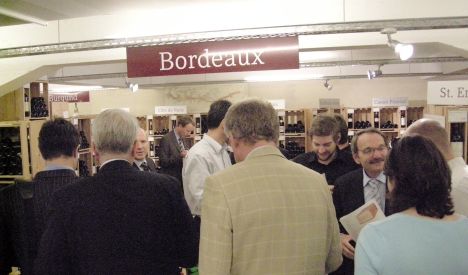 |
| Bordeaux Parcours |
Nobody won on this tour, except in terms of insights that culminated (at least for me) in the sentence: "everything has changed in the Bordelais". Such radical statements need to be examined, even if they are not simply parroted, but come from one's own reflection and experience. René Gabriel has said something similar and other Bordeaux connoisseurs do the same: Bordeaux has changed. It has changed a lot in the last few years.
As far as the châteaux are concerned: the era of the "family business" is long gone - at least in the case of the renowned wine estates. It is no longer just the Lurtons who own a considerable number of important wine estates. Today, it is trading houses, investors, insurance companies, global players, department stores' owners, marketers of luxury goods, actors. who set the tone and who, for the time being, invest almost unlimitedly: in the equipment for vinification, in the cellars, in processing, in the vineyards, in consulting. They can afford to invest a maximum of effort even in so-called "bad years" and to drastically reduce the yield. The result: 10 or 15 years ago, there were only about 50 châteaux in the "upper league" of Bordeaux growths, whereas today there are a good 200 châteaux that belong to this category. The top wine in Bordeaux is increasingly - regardless of the often capricious nature - simply "made", elaborated by precise analyses, careful selection and with the help of all conceivable technical means: ion exchange, reverse osmosis, centrifugal cone column, centrifugation, flotation, microoxigenation, electroporation, concentration, fractionation and, and, and....
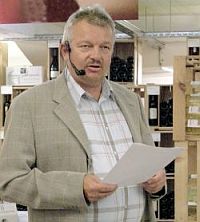 |
| René Gabriel at the Bordeaux analysis |
Even if these possibilities are still applied quite differently, for me - a Bordeaux drinker - the development is unmistakable: The difference between the highest-paid top wines and the next quality level (such as the superseconds) is becoming smaller and smaller. Yes, often even the second guard outstrips the highly acclaimed "crowned heads". Even so-called "small wines" - nameless, as they say in Bordeaux - are increasingly finding their way to the top. "Even in a vintage like 2007, there are some beautiful wines among the nameless little ones. They are rarely offered "en primeur", but deserve the attention of consumers in view of the performance of the producers."(Parker) To underline this, as it were, Parker gives a supérieur from Entre-deux-mers, "Bouscat Les Portes de l'Ame", 91-93 points, more than the renowned Gruaud-Larose (87-90 points) from Saint Julien, a winery that is generally moving up to the top more and more.
The change in the Bordeaux sector is also evident among consumers. Generation change, René Gabriel calls it. The "old" generation, which once helped the ailing Bordelais get back on its feet in the seventies with their "collecting mania" and affection, is gradually dying out. What wines are left are now turning up at auctions.
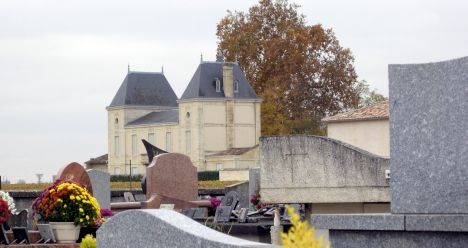 |
| Château Margaux - from a different perspective |
The following generation, which then discovered Bordeaux as a passion for high quality, looks incredulously at the current market value of wines that were once still cellared at "reasonable" prices. Even wines in the middle range, from so-called good vintages, are now being traded at x times the price. The temptation to sell and make a profit is close at hand.
I obviously belong to this generation, because I find myself thinking about the price more and more often when I open another bottle in the evening "on a very ordinary day". So is this the "famous everyday wine" that costs a good 50 or 70 euros today? The temptation is obvious to put the hoarded bottles on the market. I don't do it, but much prefer to enjoy the moment, accompanied by the otherwise rare awareness of being able to afford a "luxury" every day. This generation has largely decided (for itself): no subscription to mediocre vintages and overheated prices.
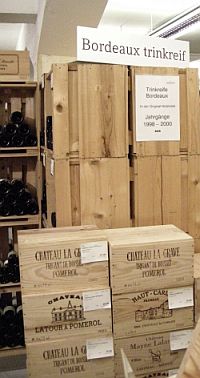 |
| Bordeaux ready to drink earlier and earlier |
And the new generation? For the most part, they are at home in faraway countries. Parker: "There is speculation that some Asian countries, especially Indonesia, Southeast Asia and Korea, as well as Russia and India, are interested in subscription. But by and large, the biggest Asian markets tend to buy bottled rather than sign contracts for wines that are still resting in barriques on the châteaux for almost two years."
This "new generation" also includes all the luxury drinkers for whom wine ultimately only means wealth, prestige, success. This new generation is asserting its interests: Wine must be a luxury good and drinkable with pleasure quite soon -- not just in 10 years. This is what the Bordelais is gearing up for. In pricing and in vinification. Parker: "Most wines from the 2007 vintage can be consumed as soon as they are in bottles (many are so precocious that they reveal this already at the barrel tasting) Most consumers will probably love this style, because the top wines of the vintage are flattering and seductive in spite of everything". With this, the Bordelais is saying goodbye to the call for slow ageing and long storage requirements.
And now? Should the 2007 be subscribed to? It's best to consult the daisy and then decide. In my case, fate decided: The last attempt at the flower crown ended with the keyword "do not subscribe"! And it's like any oracle, you just have to believe in it.
Sincerely
Yours/Yours
Peter (Züllig)